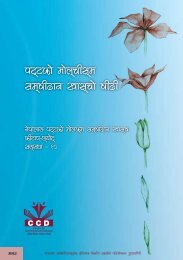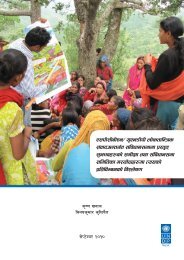The Dalits of Nepal and a New Constitution - ConstitutionNet
The Dalits of Nepal and a New Constitution - ConstitutionNet
The Dalits of Nepal and a New Constitution - ConstitutionNet
You also want an ePaper? Increase the reach of your titles
YUMPU automatically turns print PDFs into web optimized ePapers that Google loves.
60<br />
<strong>The</strong> <strong>Dalits</strong> <strong>of</strong> <strong>Nepal</strong> <strong>and</strong><br />
a <strong>New</strong> <strong>Constitution</strong><br />
Appendix 4<br />
Protecting the rights <strong>of</strong> <strong>Dalits</strong> in the Courts<br />
- Ankit Dhakal 64<br />
It is very important that the rights given by the <strong>Constitution</strong><br />
– to <strong>Dalits</strong> or any other persons – should be enforced. This<br />
means that if there is any breach <strong>of</strong> the rights, action must<br />
be taken by complaining to the Human Rights Commission,<br />
or other body with powers to deal with such claims, or the<br />
courts. <strong>The</strong>re have been a number <strong>of</strong> cases before the<br />
courts <strong>of</strong> <strong>Nepal</strong> about the rights <strong>of</strong> <strong>Dalits</strong>. Some <strong>of</strong> these<br />
could be called “Public interest litigation” (PIL). PIL aims at<br />
protecting the fundamental rights <strong>of</strong> the citizen equally<br />
irrespective <strong>of</strong> their poverty, illiteracy <strong>and</strong> social st<strong>and</strong>ing.<br />
<strong>The</strong> Supreme Court <strong>of</strong> India developed a particular form <strong>of</strong><br />
public interest litigation that we are looking here. <strong>The</strong><br />
procedure adopted by the court differs from ordinary courts<br />
procedure in a number <strong>of</strong> ways:<br />
• Cases can be started informally – by a letter to the<br />
court, <strong>and</strong> sometimes judges have even started cases<br />
themselves after reading about some injustice in the<br />
press<br />
• Concerned organisations, such as NGOs, have been<br />
able to bring cases on behalf <strong>of</strong> marginalized groups,<br />
even though the NGOs themselves have no legal<br />
interest in the problem<br />
• <strong>The</strong> court has set up committees, or commissioner<br />
individuals to investigate issues <strong>and</strong> report to the courts<br />
– in ordinary cases the parties <strong>and</strong> the courts must<br />
take the initiative to prove the facts<br />
• <strong>The</strong> court will order the public body concerned to<br />
report back to the court on progress made.<br />
<strong>The</strong>se relaxations <strong>of</strong> normal court rules can only be used<br />
where human rights are at stake, <strong>and</strong> only where the rights<br />
<strong>of</strong> the disadvantaged are concerned. Wealthier sections <strong>of</strong><br />
the community are expected to follow the usual rules. (But<br />
some take the view that some <strong>of</strong> the recent cases are<br />
more concerned with the interests <strong>of</strong> the middle classes.)<br />
Some <strong>of</strong> the famous PIL cases have included the cases abut<br />
the blinding <strong>of</strong> “under trial” prisoners in Bihar, the state <strong>of</strong><br />
protection homes for women, <strong>and</strong> various environmental<br />
cases like mining in the Doon Valley <strong>and</strong> the diesel buses<br />
in Delhi.<br />
A very recent case before the Indian Supreme Court was<br />
not a PIL case. It concerned the use <strong>of</strong> the word “chamar”<br />
when referring to a Dalit. In the box is an extract from an<br />
account <strong>of</strong> this in <strong>The</strong> Hindu <strong>of</strong> August 20 2008. This also<br />
shows the importance <strong>of</strong> laws to enforce the principles <strong>of</strong><br />
the <strong>Constitution</strong>, <strong>and</strong> how important it was for the Dalit<br />
affected to take the initiative to insist on his rights.<br />
NEW DELHI: <strong>The</strong> Supreme Court has deprecated the practice<br />
<strong>of</strong> upper castes denigrating the Scheduled Castes <strong>and</strong> the<br />
Scheduled Tribes <strong>and</strong> said “this is a disgrace to our country.”<br />
“Our <strong>Constitution</strong> provides for equality which includes special<br />
help <strong>and</strong> care for the oppressed <strong>and</strong> weaker sections who<br />
have been historically downtrodden. <strong>The</strong> SC/ST<br />
communities in our opinion are also equal citizens, <strong>and</strong> are<br />
entitled to a life <strong>of</strong> dignity in view <strong>of</strong> Article 21 <strong>of</strong> the<br />
<strong>Constitution</strong> as interpreted by this court,” said a Bench<br />
consisting <strong>of</strong> Justices Altamas Kabir <strong>and</strong> Mark<strong>and</strong>ey Katju.<br />
<strong>The</strong> Bench was dealing with a criminal appeal whether the<br />
use <strong>of</strong> the word ‘Chamar’ (an SC name) was an <strong>of</strong>fence<br />
attracting the provisions <strong>of</strong> <strong>The</strong> Scheduled Castes <strong>and</strong> <strong>The</strong><br />
Schedules Tribes (Prevention <strong>of</strong> Atrocities) Act, 1989.<br />
Writing the judgment, Justice Katju said: “In the age <strong>of</strong><br />
democracy, no people <strong>and</strong> no community should be treated<br />
as being inferior. However, the truth is that in many parts<br />
<strong>of</strong> our country persons belonging to the SC/ST are<br />
oppressed, humiliated <strong>and</strong> insulted. This is a disgrace to<br />
our country.”<br />
<strong>The</strong> Bench said: “<strong>The</strong> caste system is a curse on our nation<br />
<strong>and</strong> the sooner it is destroyed the better. In fact, it is dividing<br />
our country at a time when we must all be united as Indians<br />
if we wish to face the gigantic problems confronting us -<br />
64<br />
Ankit Dhakal is a <strong>Nepal</strong>i student at the National Law School in Bangalore, India. He was an intern with UNDP for a few weeks in 2007. This section is based on research<br />
he did in that capacity. Case names were added by Binda Magar <strong>of</strong> UNDP.


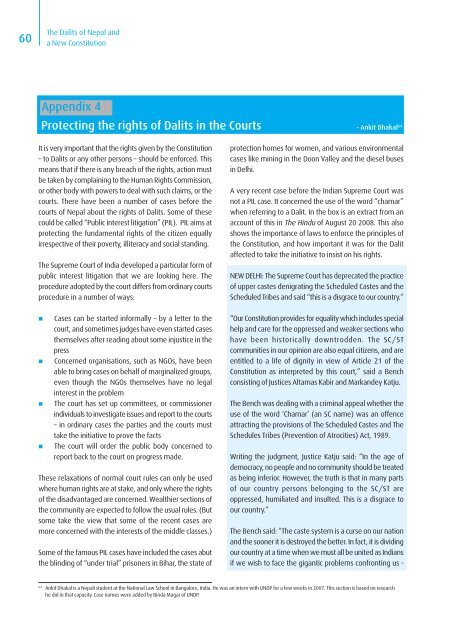

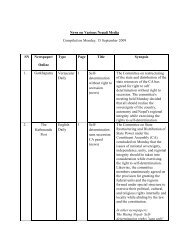

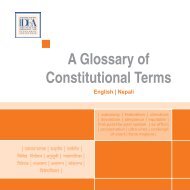
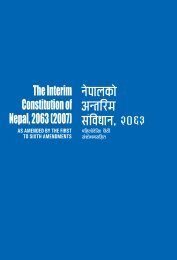
![g]k fnsf blntx? / gofF ;+l jwfg](https://img.yumpu.com/49483602/1/184x260/gk-fnsf-blntx-goff-l-jwfg.jpg?quality=85)
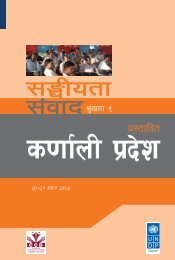
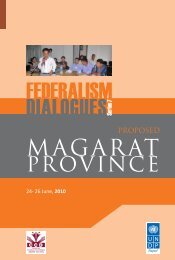
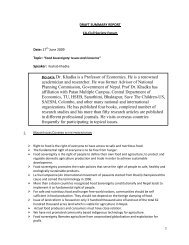
![+ljwfg;ef, /fHosf]k'g](https://img.yumpu.com/41604075/1/184x260/-ljwfgef-fhosfkg.jpg?quality=85)
